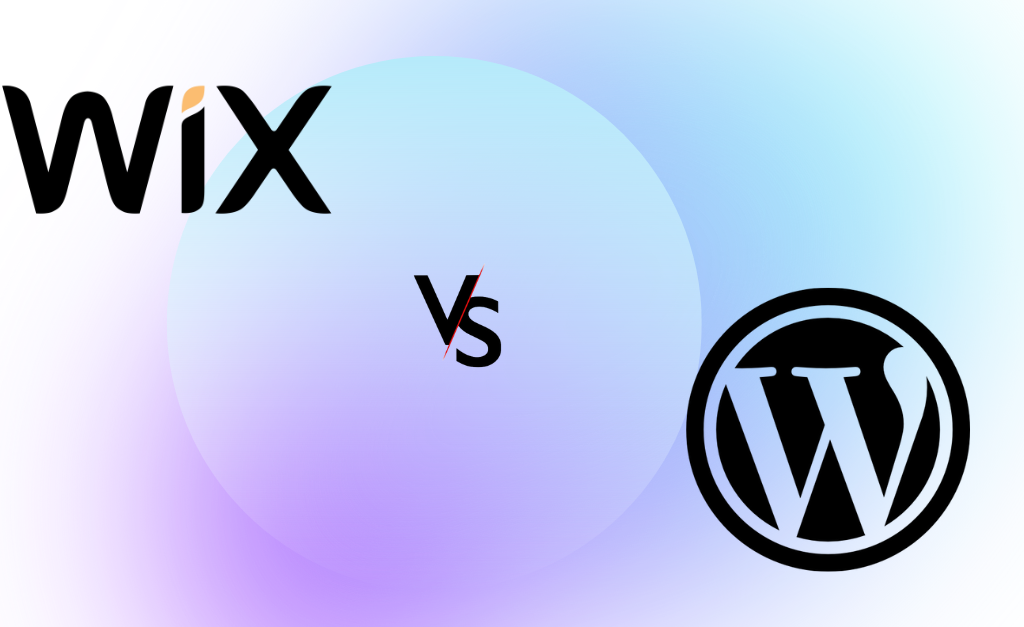When comparing WordPress and Wix, it’s important to consider factors like ease of use, design flexibility, scalability, and pricing. Here’s a breakdown to help you understand which platform might be better for your needs.

Table of Contents
1. Ease of Use
- Wix:
- Known for its drag-and-drop editor, making it ideal for beginners with no coding skills. You can visually design your site in real time and see changes as you make them.
- AI-based Wix ADI: Automatically builds a site for you based on answers to a few simple questions.
- Less of a learning curve, perfect for people who want to get a website up and running quickly.
- WordPress:
- WordPress has a steeper learning curve compared to Wix but offers more control. It’s easier to use if you install WordPress.org, but it requires learning how to navigate themes, plugins, and back-end options.
- Plugins can make it easier to manage, but customization might need some knowledge of code.
2. Design Flexibility
- Wix:
- Offers 800+ templates that are easy to customize. While templates are visually impressive, they are locked in once chosen, meaning you can’t switch templates without starting from scratch.
- Best suited for users who want a visually appealing website without much need for back-end flexibility.
- WordPress:
- WordPress themes are far more flexible and customizable. You can modify themes or even build a completely custom design with page builders like Elementor or custom code.
- Thousands of free and premium themes are available, and you can switch between themes without losing content.
3. Scalability & Customization
- Wix:
- Wix is ideal for small to medium-sized websites. It doesn’t offer much scalability for larger websites that need heavy customization or complex features.
- Its app market provides extra features, but it’s more limited compared to WordPress in terms of plugin variety and overall customization.
- WordPress:
- WordPress excels in scalability. Whether you’re building a blog, an e-commerce store, or a business website, WordPress can handle everything with the help of its 50,000+ plugins. You have full control over server resources, custom code, and scaling solutions.
4. SEO Features
- Wix:
- Wix provides basic SEO tools, including the ability to edit meta tags, URLs, and alt texts. It also includes built-in mobile optimization.
- However, advanced SEO customizations are limited in comparison to WordPress, and some users find that Wix sites don’t rank as easily.
- WordPress:
- WordPress is widely regarded as better for SEO. It has robust options for optimizing content, and powerful plugins like Yoast SEO and Rank Math offer more control over meta descriptions, titles, and sitemaps.
- WordPress also gives you more control over site performance, which can impact SEO rankings.
5. E-commerce
- Wix:
- Offers Wix eCommerce, which is great for small online stores. It provides a range of e-commerce tools but is somewhat limited in terms of features like managing inventory or complex payment gateways.
- Wix Payments and other third-party apps are available, but for more advanced stores, its flexibility is limited.
- WordPress:
- WooCommerce, the leading e-commerce plugin for WordPress, is a robust solution for building an online store. It’s scalable, with thousands of integrations, shipping options, and product management capabilities.
- If you plan on scaling your e-commerce store, WordPress/WooCommerce offers more long-term benefits.
6. Ownership and Control
- Wix:
- With Wix, you are bound by their hosting and terms of service. You have limited control over the back-end and cannot export your website fully to another platform if needed.
- WordPress:
- WordPress.org gives you full ownership of your site. You can choose your hosting provider, move your website freely, and modify your files and databases. This control makes WordPress better for businesses seeking full flexibility.
7. Pricing
- Wix:
- Wix is subscription-based and offers tiered pricing plans that range from personal websites to business and e-commerce plans. You pay for hosting, security, and templates within one package. The pricing starts at around $14/month for basic websites.
- Limited scalability in free plans.
- WordPress:
- WordPress itself is free to use, but you need to pay for hosting, which can range from $3 to $30+ per month depending on your provider and the resources you need.
- While WordPress can be more expensive due to premium themes, plugins, and hosting, it offers far more flexibility in how you scale.
8. Support
- Wix:
- Wix provides dedicated customer support via chat, email, and phone, making it easier for non-technical users to get help.
- WordPress:
- While WordPress doesn’t have dedicated support (since it’s an open-source platform), its vast community forums, blogs, and tutorials make it easy to find answers to almost any problem.
Final Verdict:
- Choose Wix if you’re looking for an easy-to-use, all-in-one platform that’s great for beginners who need a visually appealing website without needing much customization.
- Choose WordPress if you want scalability, control, and flexibility in design, functionality, and SEO, especially if you’re comfortable with a steeper learning curve.
For a deeper comparison of features and to check out pricing options, check out Wix’s website here for more details.








